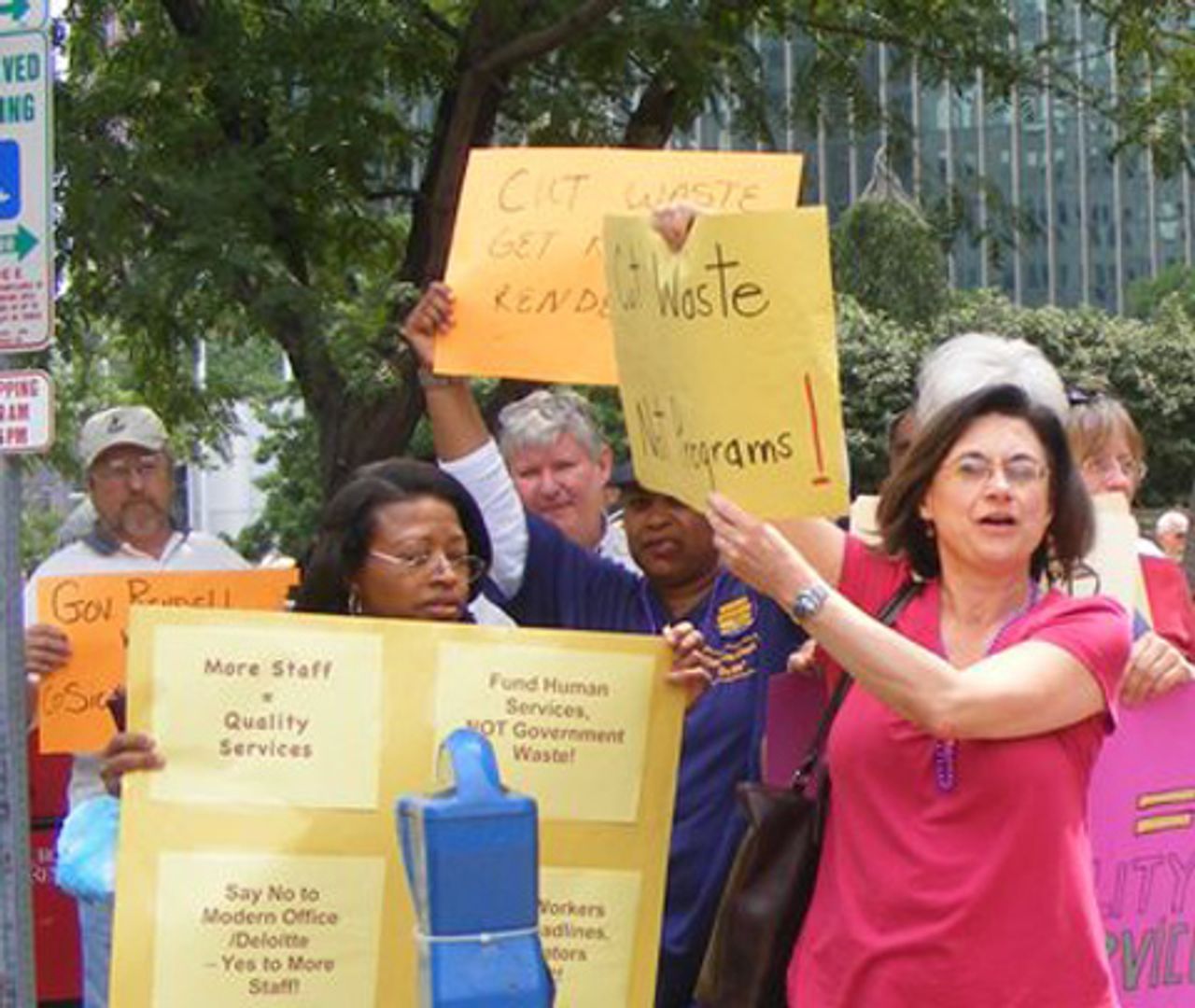In a budget stand-off with Republican lawmakers and “Blue Dog Democrats,” Pennsylvania’s Democratic governor Ed Rendell last week vetoed much of the legislature’s proposed budget, in the process slashing more than $13 billion in funding for a number of social services, including education, health care, libraries, museums, daycare and preschool programs.
Pennsylvania has been operating without a budget since July 1 after the previous fiscal year ended on June 30. Since then 77,000 state workers and vendors have not been paid. Pennsylvania ended the 2008-09 fiscal year with a $1.7 billion deficit and faces a multi-billion dollar deficit this year as a result of declining revenues.
In vetoing the funds for social programs, Rendell is demanding that lawmakers continue working on a state budget and come up with other plans to raise revenues, such as an increased tax on tobacco, a new tax on natural gas extraction and draining money from the state’s “rainy day fund.”
However, lawmakers are still far apart on the budget and seem in no hurry to reach a deal. By signing into law what Rendell called the state’s “essential services”—largely funding for prisons and police—he is guaranteeing that social services will face drastic cuts this year.
Later this week Rendell will announce the layoffs of 300 to 800 state employees.
Without state funding, many local agencies have already cut back on essential services. There have been reports that children in childcare have been kicked out because the state is no longer providing support. Many soup kitchens, homeless shelters, health clinics for veterans and the elderly have been forced to cut back on staff and on the services they provide. The Pennsylvania Higher Education Assistance Agency which gives low income college students grants averaging $2,738 a year will not be able to pay colleges until their money is released from the state.
 State workers in Pittsburgh
State workers in PittsburghRendell’s vetoes cut $4.5 billion in funding for basic education subsidy covering Pennsylvania’s 501 school districts; $520 million for public transportation; $504 million to support the state’s 14 public universities; $386 million in grants for students to attend college; about $350 million each for childcare assistance, county mental health services and school employees’ retirement funds. Also facing cuts are community colleges, special education, the Children’s Health Insurance Program, hospital payments, public library subsidies and assistance for the homeless.
Rendell and Democrats in the state House had earlier proposed a $29.1 billion budget which included cuts in social services along with a three year income tax increase. Republicans, who control the state Senate, refused to consider his plan and instead submitted a budget with no tax increase, deeper cuts in social services, and 3,000 layoffs.
Under pressure from a group of conservative Democrats known as the Blue Dog caucus, over the weekend Rendell agreed to drop the income tax measure and to accept further cuts in social programs, trimming his proposal by more than $1 billion. Republicans still would not go along, demanding that even deeper cuts need to be made. Last Monday, Rendell asked House Democrats to pass the Republicans’ $27.3 billion budget plan—which they did on Tuesday—so that he could follow through on his promise to veto most of it.
Left intact was about $11 billion in state spending which allows for the payment of most state employees and the operation of the state prisons and police. Most state employees have not received pay for time worked since July 1. Because workers are paid on a two week schedule with about half being paid every other week, 44,000 workers received only 2 days pay on July 24 and 33,000 workers received a payless payday on July 31.
It is not clear if paychecks for 44,000 workers due on August 7 will be issued and it could take up to two weeks or more before workers receive all their back pay. Another 1,600 state workers were not covered under this budget and will continue to be denied their pay.
This was not the case for state lawmakers. Even before Rendell signed the budget, state lawmakers began issuing themselves paychecks. The state legislature has a $100 million slush fund that they set up so they would continue to be paid while there was no budget.
In a separate but related matter, Pennsylvania Senate Republicans are refusing to consider another bill that would allow the city of Philadelphia to raise its sales tax from the current seven percent to eight percent. Senate Majority Leader Dominic Pileggi, said that he would not consider the bill until he has a final budget deal worked out with Rendell.
Without the extra revenue, Philadelphia Mayor Michael Nutter says that he will have to cut 3,000 jobs, shut down all libraries, close all recreation centers, stop all park programs and cut back trash pickup to every other week.
Last Tuesday, before Rendell vetoed much of the state budget, the World Socialist Web Site spoke with state workers about the impact the payless paydays and cuts were having on the population.
Clara Myers, an income maintenance caseworker said. “I have expenses. I have childcare, I have to pay for daycare so I can come to work. I still have to pay for parking and transportation to work. I took out a loan, but our credit union says they don’t have money to loan us anymore.
“Some case workers are applying for food stamps and other benefits. But not everyone is eligible if you have a second income in the family.
“Here in Allegheny County, childcare is provided through the Childcare Partnership, which is funded though the Department of Public Welfare. They are not receiving their money from the state which means that they are not paying for childcare for parents who are on low income. Childcare is very expensive—these are the mothers who are making just the minimum wage, not necessarily working 40 hours a week—they need childcare so that they can go to work. What is going to happen to them?”
 Beth Mikus and Bruce Travers
Beth Mikus and Bruce TraversBeth Mikus, a caseworker supervisor with 20 years service, and vice-chair of the local SEIU chapter, described some of the cuts that state workers have already faced. “We have been seeing a decline in the number of case workers and an increase in the work load. In 2004, many older workers retired and their positions have never been refilled. For the past year and a half there has been a hiring freeze.
“We have seen a great increase in need in this area because of the state of the economy. In the past few months, there have been 2,100 new cases in the three rivers district, which is one of five here in Allegheny County. People need medical assistance, help in paying for prescriptions or going to a hospital. Now we are trying to figure out how to process all the applications we are getting from State workers who are not getting paid.
“The lawmakers have one job that they must do, and that is to pass a budget each year. Now it has been 35 days without a budget and how long is this going to go on for? It is the most vulnerable people that are going to get hurt.”
Bruce Travers, a caseworker for four years, described the impact of the cuts, “I have 700 cases. That is about 1,700 clients in the households. That is about double what I had when I started here. You can’t take care of them. If someone calls you with a problem you usually have to spend a lot of time to help them, often you have to have them send in some forms or other things, and if they forget you don’t have the time to remind them.
“They want to make this an impersonal job. They are spending $500 million to revamp the system so that clients don’t see a caseworker, but instead just enter the information on a computer screen or through a telephone system where you have to push 25 options before you talk to a real person. Then instead of having a caseworker, a client will go to whoever is next. How can we give service to people if we have never built a relationship with them and understand what is happening in their lives?”
